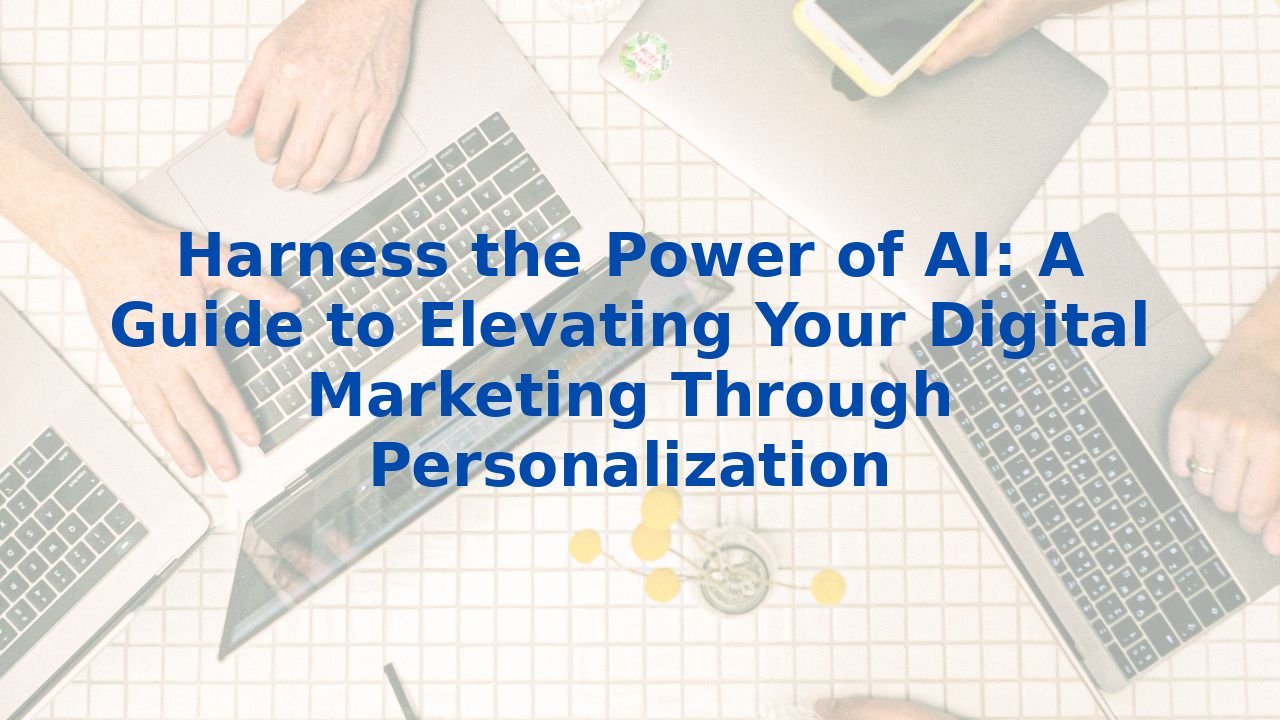Harness the Power of AI: A Guide to Elevating Your Digital Marketing Through Personalization
The Impact of AI on Digital Marketing: Enhancing Targeting and Engagement
Introduction
In today's fast-paced digital world, businesses face the constant challenge of standing out in a crowded marketplace. Enter Artificial Intelligence (AI)—the groundbreaking force reshaping digital marketing strategies and consumer engagement. Harnessing AI's potential allows organizations to craft personalized campaigns that resonate with their audiences like never before. This guide delves into how AI can elevate your digital marketing, focusing on enhanced targeting, increased efficiency, and the significance of training employees to adapt effectively to this transformative technology.
The Role of AI in Digital Marketing
AI operates at the intersection of innovation and data analysis. By utilizing advanced algorithms and machine learning capabilities, AI helps marketers sift through considerable amounts of data to extract meaningful insights. This process enables the crafting of highly targeted marketing campaigns, precisely aligned with consumer preferences and behaviors. Gone are the days of one-size-fits-all approaches; AI empowers marketers to understand a customer’s journey, their likes, and even their anticipated needs before they even articulate them.
Personalization: The Key to Effective Marketing
At the heart of AI-driven marketing lies personalization, a crucial element for success. Leveraging AI enables businesses to analyze consumer data comprehensively, creating tailored messages that resonate deeply with their audience. For instance, from customized product recommendations to personalized email campaigns, each interaction becomes uniquely relevant.
Imagine logging onto your favorite e-commerce site, and instantly, you are greeted with personalized offers based on your previous purchases and browsing history. This level of engagement fosters a connection that elevates customer experiences, resulting in improved conversion rates and brand loyalty.
Benefits of AI in Digital Marketing
Integrating AI into digital marketing strategies can yield transformative benefits, such as:
1. Enhanced Targeting:
AI excels at quickly processing vast datasets, identifying intricate patterns and trends that might go unnoticed by human marketers. This allows for precision targeting and ensures marketing initiatives reach the most relevant audience segments, thereby maximizing return on investment (ROI).
2. Increased Efficiency:
AI streamlines processes, effectively reducing the time and effort involved in manual data analysis and campaign execution. By automating repetitive tasks, AI frees teams to focus on strategic planning and the creation of innovative content.
3. Improved Customer Experience:
By delivering personalized content and timely offers, AI enhances user interactions, making them far more meaningful. When consumers feel understood, their journey is smoother, increasing the likelihood of a conversion.
4. Data-Driven Decision Making:
AI empowers marketers with actionable insights derived from real-time analytics, fostering a culture of informed decision-making. This ensures that marketing strategies can pivot and adapt to evolving consumer expectations.
The Importance of Employee Training for AI
While the potential of AI is both exciting and vast, its efficacy hinges on the proficiency of the workforce engaging with it. Investing in proper training ensures that employees can effectively leverage AI technologies within their roles. Training programs tailored to understanding AI algorithms and data interpretation are crucial. Moreover, educating employees about ethical considerations surrounding AI, including data privacy, establishes a responsible approach to utilizing these advanced tools.
By equipping teams with the right skills, companies not only optimize their marketing strategies but also foster an environment of innovation and growth. Understanding the capabilities of AI allows marketers to maximize the technology's potential, yielding results that would be unattainable otherwise.
Conclusion
As digital marketing continues to evolve, the integration of AI stands as a crucial strategy for businesses seeking to boost their engagement and targeting capabilities. The personalization that AI empowers leads to experiences that resonate profoundly with customers, ultimately driving conversion rates and brand loyalty. However, embracing AI effectively requires a commitment to training employees in adopting these technologies. By investing in your workforce, you set the stage for ongoing success in an ever-competitive digital landscape. The time to harness AI is now—are you ready to elevate your marketing strategies?



